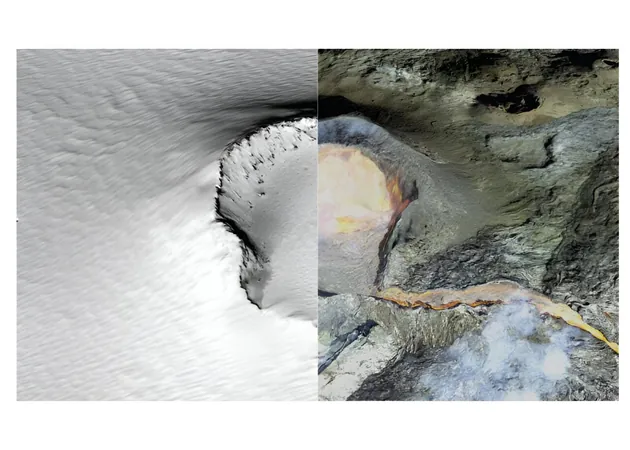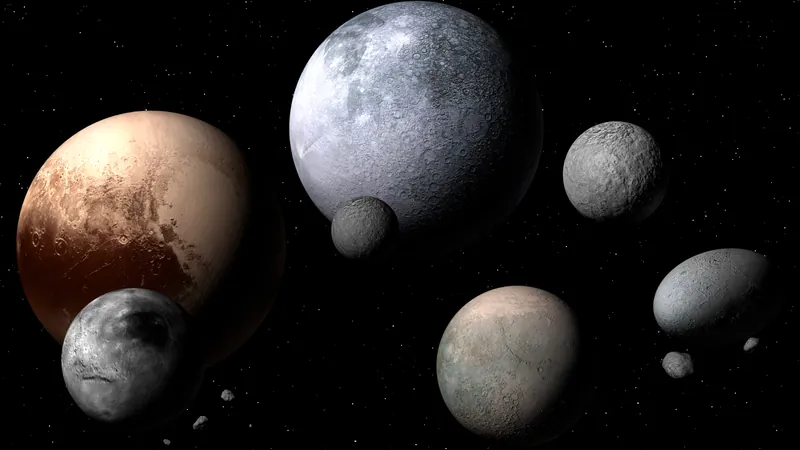
Groundbreaking Discovery: Mars May Host Its Own Spatter Cone!
2024-09-27
Author: Rajesh
Groundbreaking Discovery: Mars May Host Its Own Spatter Cone!
In a stunning revelation, a team led by postdoctoral researcher Ian T.W. Flynn at the University of Idaho has identified what appears to be the first confirmed volcanic spatter cone on Mars. The research, conducted under the guidance of assistant professor Erika Rader, has now been published in the renowned scientific journal Icarus, signaling a significant leap in our understanding of Martian geology.
The team utilized a combination of detailed morphological investigations and sophisticated ballistic modeling to analyze this intriguing Martian feature, which bears a striking resemblance to spatter cones formed during the 2021 eruption of Fagradalsfjall in Iceland. "Spatter cones are so common on Earth that it seemed extremely unlikely that they simply didn’t exist on Mars," Rader explained. "Their discovery provides a new benchmark for simulating volcanic activity on the Red Planet."
Spatter cones typically form during explosive volcanic eruptions, characterized by hot lava fragments ejected into the air and landing back on the surface. They are found in various locations on Earth, including the Craters of the Moon National Monument in Idaho, highlighting a fascinating connection between terrestrial and extraterrestrial volcanic processes.
Flynn emphasized the importance of this find, stating, "The similarity between the Martian and Icelandic spatter cones suggests that the eruption dynamics seen in Iceland over recent years were also at play on Mars." With this discovery, scientists can now expand the range of volcanic eruption styles that may have occurred on Mars, allowing for a more nuanced understanding of its volcanic history.
This breakthrough holds significant implications for our understanding of Mars’ geological past, shedding light on the gases present in Martian magma and the environmental conditions during its eruptions. Notably, it aligns Mars' volcanic activity closer to the present-day eruptions occurring in places like Iceland and Idaho, providing a potential link between past and present volcanic processes across different planets.
"We are excited about this discovery because it fills a crucial gap in our understanding of Martian volcanology, paving the way for further research into spatter features on Mars," Flynn concluded.
As scientists continue to explore the mysteries of our solar system, this finding could change the narrative of Mars' volcanic activity and innovation in planetary science, igniting a new era of exploration and discovery!



 Brasil (PT)
Brasil (PT)
 Canada (EN)
Canada (EN)
 Chile (ES)
Chile (ES)
 Česko (CS)
Česko (CS)
 대한민국 (KO)
대한민국 (KO)
 España (ES)
España (ES)
 France (FR)
France (FR)
 Hong Kong (EN)
Hong Kong (EN)
 Italia (IT)
Italia (IT)
 日本 (JA)
日本 (JA)
 Magyarország (HU)
Magyarország (HU)
 Norge (NO)
Norge (NO)
 Polska (PL)
Polska (PL)
 Schweiz (DE)
Schweiz (DE)
 Singapore (EN)
Singapore (EN)
 Sverige (SV)
Sverige (SV)
 Suomi (FI)
Suomi (FI)
 Türkiye (TR)
Türkiye (TR)
 الإمارات العربية المتحدة (AR)
الإمارات العربية المتحدة (AR)